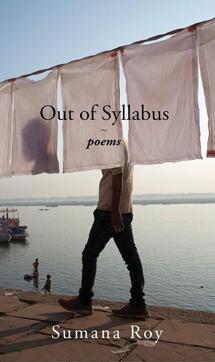Review: Out of Syllabus by Sumana Roy
There are fresh discoveries on every page of Out of Syllabus, Sumana Roy’s debut collection of poetry.

I want to begin with a confession. Writing about poetry is terribly difficult or at least I find it so. I read, teach and talk about poetry with great enthusiasm. I often find myself hunting for the right expression in the middle of a conversation on poetry. I don’t know if language is really an aid or imperils thought in such situations. Then there are days when poetry is your only accomplice. It knows your anguish, lends a compassionate ear to your despairs and longings. It celebrates your accomplishments and provokes you into action. Poetry is protest but poetry is also intimacy and how does one articulate intimacy in writing? Does such a language exist? How do poets do it? I have many questions but no easy answers. My struggle with poetry is ongoing.
I agreed to review Sumana Roy’s debut collection of poems, Out of Syllabus with great trepidation and self doubt. Trepidation because of the luminosity of her verse and self doubt owing to some of my rumination expressed above. Can a review do justice to her verse? Out of Syllabus is a remarkable debut collection glowing with wisdom and earnestness. While reading the poems, I was filled with envy for the poet’s understanding of life and interiority of human relationships and encounters. I also particularly admire her earnestness to draw subjects or occurrences from daily life and then find new registers to voice those observations/sentiments. Sample these:
“Every wedding anniversary, we behave like mountaineers,/and pretend to have conquered distance.” Or “Touch was a poem you taught me to read.”
Read more: Review: Missing by Sumana Roy
Roy writes from Siliguri in north Bengal and leads a relatively reclusive life. Is it her location that enables this vision in her poetry or is that too simplistic a reading of her work? The poems abound with her interest in people, places, plants, history and life in general. However, they are never encyclopaedic, successfully resisting the temptations of a debut collection. Her taiyaari or preparedness to write never dominates the writing. The mundane and the quotidian are conspicuous by their presence but there are fresh discoveries on every page. From Chair to Sunlight, her fancy attracts all and it’s done in a quiet, unembellished way. The poetic voice recedes into the background as a silent observer. There is no haste in her poems. She seems to have made friends with time. Her poems also record a ‘compassionate looking’. In Biraha, she writes:
“Love makes of everyone
a parent. All distances
seem too long, all moments
a first-aid kit on call.
Time becomes a zoo-
our past a caged animal.”
The poems are tactile. You feel the poet’s presence, as if she is in direct conversation with the reader. Furthering her quest into human relationships, she writes “Every relationship is a long-distance relationship”. I couldn’t agree more with the thought and its inherent philosophy. There are lines that stand out for unusual associations glimpsing a fertile, introspective mind at work. The poems compel you to think and awaken inner dialogues. In Adult, she writes –
“You become an adult when you discover-/that shoes also cast shadows though we might stamp on them;/that a calling bell is not meant to alert but to prevent entries;”.

This is a collection to read, breathe, pause and then read again. I am tempted to use the term ‘delicious’. Is it appropriate? I don’t know. I can’t tell. But isn’t poetry also about upending the obvious? Read for yourself and decide.
Kunal Ray teaches literary & cultural studies at FLAME University, Pune






